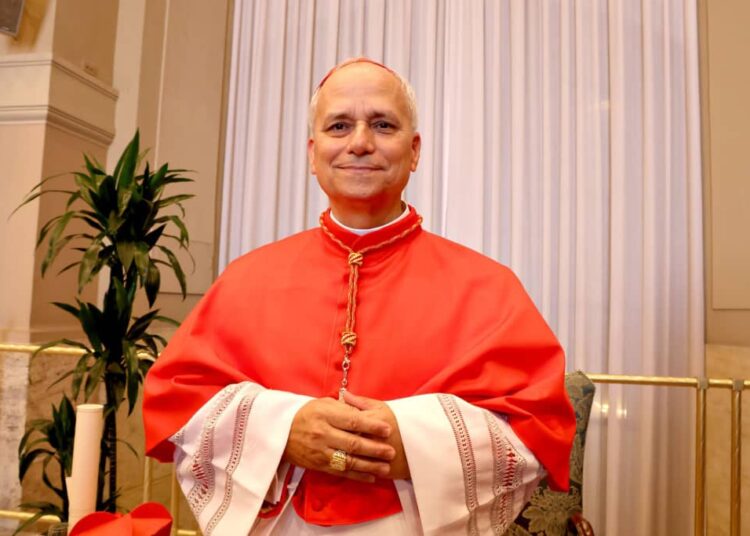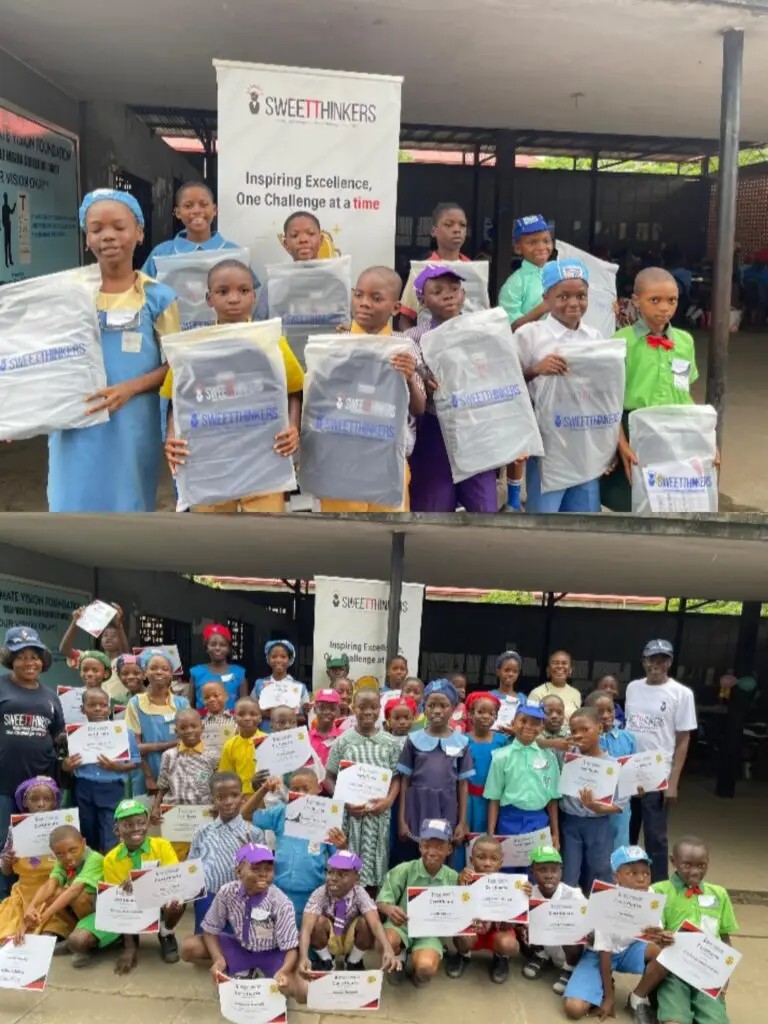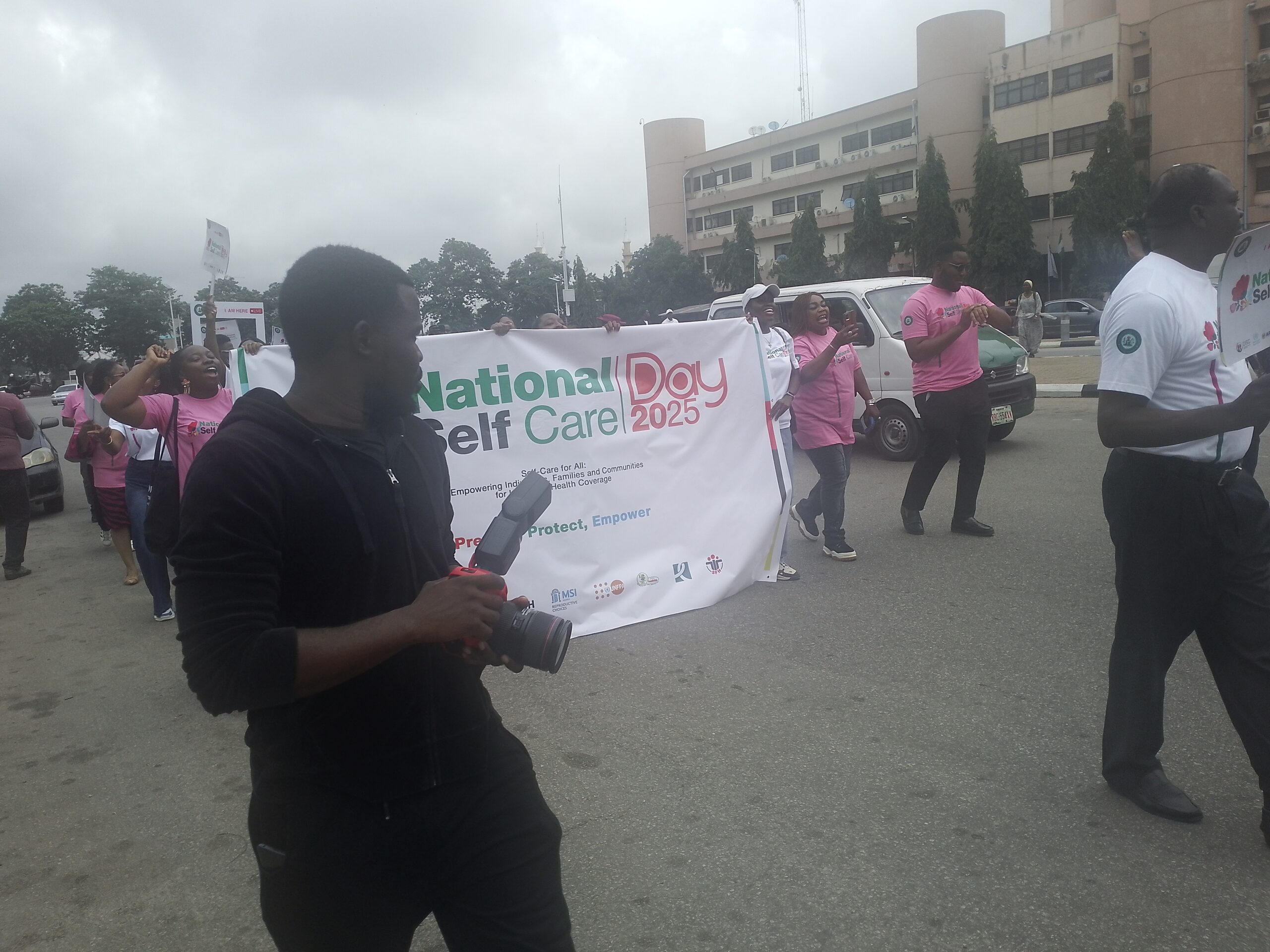
By Fatima Saka
The Federal Government has reaffirmed its commitment to strengthening local manufacturing in the health sector and empowering Nigerians to take charge of their well-being, as it commemorated the maiden National Self-Care Day on Wednesday.
Speaking at the ministerial press briefing in Abuja, the Honourable Coordinating Minister of Health and Social Welfare, Professor Muhammad Ali Pate who was represented by Pharm. Olubunmi Aribeana, Director of Food and Drug Services, said that the administration is deliberately working to reduce dependence on foreign imports and unlock Nigeria’s local content potential.
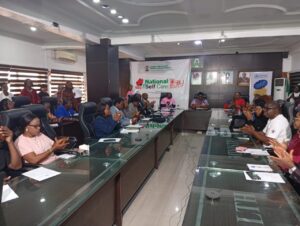
“In response to lessons from the COVID-19 pandemic, where global supply chains collapsed, the current administration decided we must produce a significant portion of our essential health needs locally,” he stated.
He highlighted ongoing efforts under new executive orders focused on local manufacturing, which include tax waivers, importation incentives for machinery, and mapping of the active pharmaceutical ingredient (API) ecosystem. The aim, he said, is to create a robust enabling environment that encourages sustainable production of both health products and their essential raw materials within Nigeria.
The Minister also referenced the “5+5 Policy,” which allows manufacturers to import for the first five years, grants another five years to establish local production, after which no waivers will be provided for imports. “This policy extends beyond medicines, it covers all health products and consumables,” he emphasized.
The event also marked Nigeria’s first official observance of National Self-Care Day, aligning with the global observance on July 24. The day was commemorated under the theme “Self-Care: Empowering Individuals, Families, and Communities for Universal Health Coverage,” and the slogan “Prevent, Protect, Empower.”
According to Prof. Pate, self-care is a vital strategy to bridge healthcare gaps, especially in underserved and remote areas. “Self-care is not the absence of care, it is the amplification of care. It puts the power of health in the hands of individuals,” he said.
The Minister noted that Nigeria has already developed national guidelines and a demand generation strategy for self-care in sexual, reproductive, and maternal health. These frameworks are designed to empower citizens with the knowledge and tools to care for themselves, reduce reliance on overstretched health systems, and promote preventive healthcare.
“Your health is your wealth. Own it. Protect it. Celebrate it,” Prof. Pate emphasized..
Delivering welcome remarks, Director of Family Health, Dr. Binyerem Ukaire, stressed that the day marks a turning point in how health is perceived and practiced in Nigeria. “Healthcare is not just about treatment; it is about prevention, safeguarding lives, and empowering people to make informed decisions,” she said.
She further commended partners and stakeholders for supporting Nigeria’s push towards a more resilient and self-aware society, adding: “Together, we will redefine health.”
“As the country embraces both a policy shift and a cultural transformation, the Federal Government is urging citizens, private sector players, and development partners to rally behind its efforts to promote local manufacturing and embed self-care as a national value,” she emphasized.
In his goodwill messages, Dr. Muyi Aina, Executive Director/CEO of the National Primary Health Care Development Agency (NPHCDA) who was represented by Aisha Ibrahim Jalingo said:“We are pleased and honoured to participate in this special Memory Booth celebration in commemoration of National Self-Care Day. This day highlights the transformative power of self-care in promoting universal health coverage and achieving our collective development goals.
“By prioritizing self-care, individuals are empowered to take charge of their health, prevent illness, and enhance their overall well-being. Self-care is not only a personal responsibility, it is a strategic pillar for strengthening our health systems and building resilient communities.
On behalf of Dr. Muyi Aina and the entire NPHCDA, we reaffirm our commitment to integrating self-care into primary health care delivery, ensuring that every Nigerian has access to the tools, knowledge, and support needed to manage their health effectively.
Dr. Alex Garasira, Acting WHO Country Representative, who emphasized the growing relevance of self-care in the face of healthcare workforce shortages and limited access to essential services in Nigeria and across the African region.
“With millions in the African region, including Nigeria, lacking access to essential health services and a global shortage of healthcare workers, self-care interventions have the potential to significantly transform how people manage their health and well-being,” Dr. Garasira said.
WHO reiterated its commitment to supporting Nigeria in integrating self-care into routine health services.
“Our progress will be accelerated through collective efforts. Working together, we can build a safer, healthier world for all of us,” Dr. Garasira affirmed
Here is a professionally improved and coherent version of your report, retaining all key messages while enhancing clarity, structure, and flow:
During the awareness road walk, Dr. Anthony Mwala, Assistant Chief Programme Delivery Officer at the Society for Family Health (SFH), emphasized that self-care is not just a health trend but a transformative concept that empowers individuals, families, and communities to become active stakeholders in their health management.
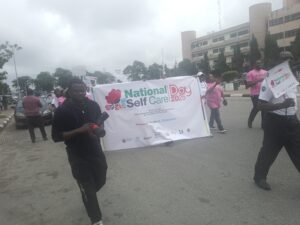
“Self-care means taking responsibility for your health – from prevention to treatment. For instance, if you’re prescribed a medication, you don’t need to visit the hospital every time to take it. You’re empowered and trained to manage it yourself. That is self-care,” he explained.
Dr. Mwala stressed that the message for Nigeria, as the country marks the 2025 celebration, is clear: achieving Universal Health Coverage requires empowering people through self-care.
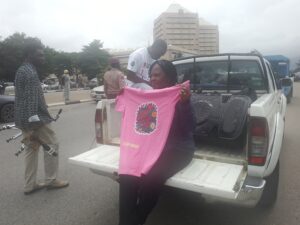
“The theme for this year’s celebration is ‘Prevent, Protect, Empower’ – prevent illness, protect the vulnerable, and empower every Nigerian to manage their health. The government has taken a significant step by launching this initiative, and must now continue to support awareness efforts and provide resources at all levels,” he added.
Taking Self-Care to the Grassroots, Dr. Mwala highlighted ongoing efforts: “Although this is the first official Self-Care Day, the Society for Family Health, since 2020, has been working with the Federal Ministry of Health and other partners to spread self-care messages across grassroots and subnational levels. We are working directly with family planning coordinators and healthcare providers in at least 25 states to integrate self-care into community health delivery.”
According to him, self-care tools being promoted include HIV self-testing kits, HPV self-sampling kits, malaria rapid diagnostic test kits, and the DMPA-SC (Depo-Medroxyprogesterone Acetate Subcutaneous), a self-injectable contraceptive method.
“These innovations are changing lives. Our goal is to reach the poor and vulnerable and ensure equitable access to care,” he said.
Also speaking, Jennifer Adibambor, SFH’s Country Manager for Partnership and Collaboration, underscored the importance of proper health knowledge:
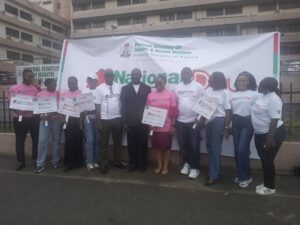
“Self-care is not about going to the spa or getting a makeover. It’s about making informed decisions about your health. During COVID-19, we saw how many lives could have been saved if people had the right knowledge. For example, don’t just pop malaria pills when you feel ill—get tested first. That’s responsible self-care.”
She also pointed out innovations such as the DMPA-SC self-injection for family planning and HIV self-testing kits, which allow individuals to know their status privately and take necessary steps.
Dr. Faith Eromo, Senior Monitoring and Evaluation Officer at the Pharmaceutical Society of Nigeria Foundation (PSNF), called on Nigerians to prevent and manage common diseases through early detection and empowered care.
“Diseases like malaria, HIV, hepatitis, and even family planning challenges can be managed using available self-care kits. We hope Nigerians will embrace these tools and take control of their health. Prevention is better than cure.”
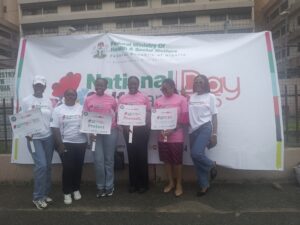
Representing White Ribbon Alliance Nigeria, Oyare Oche, Media, Advocacy, and Communications Officer, reiterated the organization’s commitment to advocating self-care policies, particularly around reproductive and maternal health.
READ ALSO: Nigeria’s Senate to Showcase Agricultural Innovations at COP30, Drives for Green Colleges
Senate Demands Urgent Reforms, Unity in North West Development Commission
“Self-care is not the same as self-medication. There are guidelines from the WHO and national frameworks directing its safe use. We urge Nigerians to prevent, protect, and empower themselves through self-care practices that align with national and global health standards,” she said.
As Nigeria marks this historic day, health experts, civil society organizations, and the government agree: empowering citizens with the right tools, knowledge, and access will be key to improving public health and achieving Universal Health Coverage for all.




